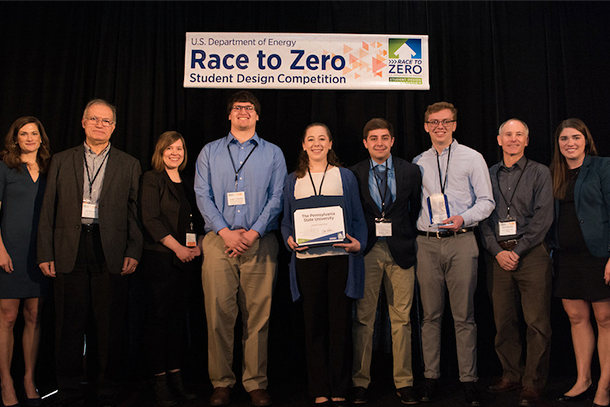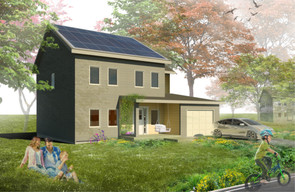
The 2018 Penn State Race to Zero Student Design Competition team and faculty advisers gather after winning the Suburban Single-Family Housing Contest with representatives from the U.S. Department of Energy, organizers of Race to Zero. Pictured, left to right, are Sarah Zaleski, Ali Memari, Sarah Klinetob Lowe, Justin Charles, Carly Asadi, Neno Agnello, Sean Copeland, Sam Rashkin, and Rachel Romero.
Penn State places 1st at 2018 Race to Zero Student Design Competition
04/24/18
UNIVERSITY PARK, Pa. – The Penn State student team won first place in the Suburban Single-Family Housing Contest of the U.S. Department of Energy Race to Zero Student Design Competition on April 22.
One of 40 teams representing 34 institutions and five countries, the Penn State team qualified as finalists to attend the competition at the National Renewable Energy Laboratory (NREL) in Golden, Colorado, April 20-22. The annual competition provides the next generation of architects, engineers, construction managers, and entrepreneurs with the skills and experience to start careers in clean energy and generate creative solutions to real-world problems. This year’s competition began with students from 84 teams, representing 68 collegiate institutions across nine countries before the selection of finalists.
Penn State partnered with a regional production builder, S&A Homes, to redesign their most popular single-family detached-home design to meet the Zero Energy Ready Home (ZERH) design standard. Over the past seven months, the student team periodically met with Bob Shoemaker, tech services construction manager of S&A Homes, to learn about the company’s process of design and construction and to review their competition project with him. Additionally, in late September, students attended a site visit through an under-construction home at a local development with Tom Jacobs, land manager of S&A Homes, to better understand construction details for their home design. The students’ final ZERH design utilized two of S&A Homes’ top-selling home models to create a new, feasible, high performance home that is accessible and sustainable for home buyers throughout the south and central Pennsylvania regions.
Requiring an interdisciplinary team to produce a successful design, the project team consisted of students representing multiple colleges and departments at Penn State. The student team was led by veteran competition team members: Tom Hanna, a senior in mechanical engineering, and Sean Copeland, a junior in energy engineering. Team members included students in architecture: Manal Anis, Puja Bhagat, Jeffrey Carroll, Umme Hani, Alexis Mengers and Jonathon Wong. Also, it included students in architectural engineering: Neno Agnello, Michael Haftl, Emily Bogert, Justin Charles, Carol Chen, Hanwen Mu, Carly Asadi and Blaise Waligun. Additional team members were Elizabeth Basista, energy engineering, and Alex Vinitski, civil engineering.
“Working with team members of different disciplines in the way that you would in the industry has made this competition an incredibly valuable experience,” said Asadi, leader of the energy and solar PV analysis subteam. Overall, students found the collaborative learning environment an enriching part of their education.
“The Race to Zero project has been the most rewarding experience of my college career. I was able to learn about concepts outside of my field and expand myself socially and educationally,” said Copeland.
The competition features a one-credit course, CE 411, which is co-taught by Sarah Klinetob Lowe, housing systems specialist of the Pennsylvania Housing Research Center (PHRC), and by Chris Hazel, research technician for the Energy Efficient Housing Research Group in the Hamer Center for Community Design and past Race to Zero student team leader.
Ali Memari, Bernard and Henrietta Hankin Chair of Residential Construction and director of the PHRC, served as the head competition adviser. Additional faculty advisers included Lisa Domenica Iulo, associate professor of architecture and director of the Hamer Center for Community Design; Andy Lau, associate professor of engineering design; Brian Wolfgang, associate director of the PHRC; and Chris Hine, housing and land development specialist of the PHRC.
“On behalf of all of this year's competition advisers, it was truly a pleasure working with this team of emerging leaders in sustainable design. Their intelligence, dedication, attention to detail, and eagerness to learn propelled them through a successful integrative design process with local production builder S&A Homes and a challenging design problem, to this year's first-place contest finish. We are extremely proud of their accomplishments and look forward to building on this momentum with them to launch into next year's competition with project partner Habitat for Humanity of Greater Centre County,” said Klinetob Lowe.
The student team is hosting an open house from 6 to 7:30 p.m. Wednesday, April 25, in the Jury Space of the Stuckeman Family Building on the University Park campus. They will be highlighting their 2018 first place project and looking forward to the 2019 competition. Any interested students, faculty mentors, and industry advisers are invited to attend.



